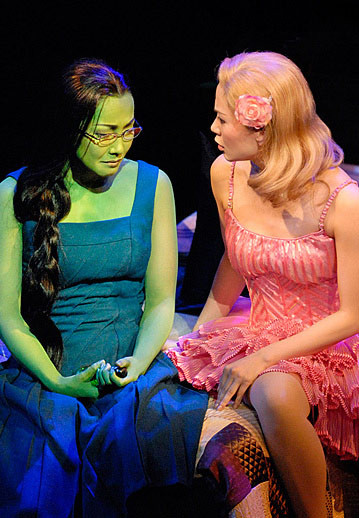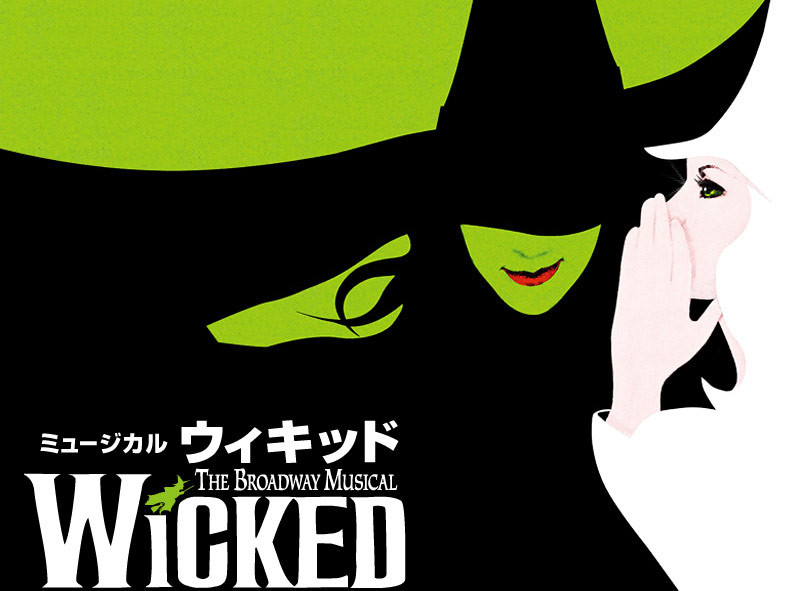Wickedly Japanese
Broadway brought to Japan
The Shiki Theatre Company (Gekidan Shiki) has been producing Japanese-language versions of major plays and musicals for over fifty years. With four separate venues operating in Tokyo, as well as theatres in Kyoto, Nagoya, Osaka, and Fuokuoka, the current lineup includes The Phantom of the Opera, Cats, Anne of Green Gables, Wicked, Mama Mia!, and a ten-year ongoing run of the Lion King.
Wicked, a Broadway musical built on an intricate back-story between Oz’s Wicked Witch of the West and Good Witch of the North, has been running in Tokyo since 2007. The set fits snugly into Shimbashi's cozy Dentsu Shiki Theatre, the one balcony extending high into the rafters, where a gigantic dragon stares ominously into the audience as if only awaiting the command to come to life. Outside, the lobby has a canyon-like feel, with ripples of water forming shimmering waterfalls that flow through three stories of high inverted archways.
Wicked's set is suffused with a clockwork motif, reminiscent less of the candy-coated 1939 movie musical than of the grim machinations of 1985’s darker Return to Oz, interlaced vines giving the tic-tock machinery a distinctly decayed and weatherworn look.
The mid-sized cast—less than 30 members in total—move through a series of agile sets that transform from schools and bedrooms to bridges and towers, and from dark and smoky forests to the green-saturated Emerald City itself.

The story opens with Glinda, the Good Witch of the North (Miyuku Numao), descending on her iconic—and later ridiculed—floating bubble, delivering the news of the Wicked Witch’s demise. When questions arise about her relationship to the Witch, we begin an extended flashback taking us from the Witch’s green-skinned birth to her troubled school-age years and her undeserved casting as the enemy of Oz, finally ending with her watery downfall at the hands of Dorothy.
The first act plays like a high school odd-couple drama with Harry Potter thrown into the mix: Glinda is the popular girl at school, a regular wand-wielding Heather, while Elphaba (Asami Higuchi), fated to achieve infamy as the Wicked Witch of the West, is a green-skinned pariah who has only come to school to care for her paraplegic sister, Nessarose (Mayumi Ogai). Though they instinctively loathe one another, Glinda and Elphaba eventually form an unlikely friendship, only to quickly find themselves competing for the affections of the dashing and dim-witted prince Fiyero (Yusuke Kitazawa).
Numao gets stuck with the banality of being the 'good-girl,' and while she trills out high notes with appropriate cringe-inducing treacle and Valley-girl ditziness, it’s Higuchi’s Elphaba who steals the show, belting out full-throated emotional laments that gradually transform into unrepentant chords of defiance. The stage bends to her will, bathing her in intersecting spotlights, isolating her in a field of throbbing azure, or turning pitch black as she rises into the sky to send Emerald City soldiers sprawling on their backs.
The story, based on Gregory Maguire’s Wicked: The Life and Times of the Wicked Witch of the West, works furiously to connect all the seemingly unrelated elements of the 1939 film. Revealed are the origins of the ruby slippers, the cowardly lion, the tin man, the scarecrow, and even the relation between the Witch and the Wizard, played by an avuncular Takeshi Matsushita. Elphaba’s gradual composition of her famous costume harkens to Clint Eastwood’s piece-by-piece wardrobe assembly in The Good, The Bad, and The Ugly.

By the time Dorothy arrives, all is not as it seems in Oz: Glinda allows herself to be used for political machinations in exchange for universal adoration, the Witch of the East is a powerless pawn used to draw out her sister, and the Witch of the West is only an outcast because the Wizard relies on a state of fear to maintain his position of power.
Beyond the time-worn themes of power and corruption, Wicked is in essence an examination of the vapidity of popularity and the fallibility of perception. For a bubble-headed Glinda to extol the importance of being ‘Popular’ seems no more than an endearing foible, but it’s downright creepy to see a geriatric Wizard cling to the same ideals as he sings that adulation is ‘Wonderful.’
The last third of the production channels Tom Stoppard’s Rosencrantz and Gildenstern are Dead, revealing the hitherto off-screen interactions of secondary and unknown characters while Dorothy wanders Oz offstage. The final, secret resolution between Glinda and Elphaba is poignant, but somewhat damaged by the writers’ unwillingness to close on a truly tragic note.
Wicked is continuing its open-ended run at the Dentsu Shiki Theater in Shimbashi, Tokyo, with tickets presently available until March 31st. Tickets can be ordered online, and range from ¥8,800-¥11,500.
Information:
Published February 2009. All images courtesy of Gekidan Shiki.

